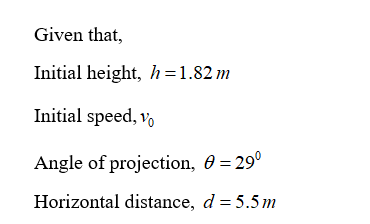A student throws a water balloon with speed v0 from a height h = 1.82 m at an angle θ = 29° above the horizontal toward a target on the ground. The target is located a horizontal distance d = 5.5 m from the student’s feet. Assume that the balloon moves without air resistance. Use a Cartesian coordinate system with the origin at the balloon's initial position. A) What is the position vector , Rtarget, that originates from the balloons original position and terminates at the target? Put this in terms of h and d, and represent it as a vector using i and j. B) In terms of the variables in the problem , determine the time,t, after the launch it takes the balloon to reach the target. Your answer should not include h. C) Create an expression for the balloons vertical position as a function of time, y(t), in terms of t, v0, g, and θ.
A student throws a water balloon with speed v0 from a height h = 1.82 m at an angle θ = 29° above the horizontal toward a target on the ground. The target is located a horizontal distance d = 5.5 m from the student’s feet. Assume that the balloon moves without air resistance. Use a Cartesian coordinate system with the origin at the balloon's initial position.
A) What is the position vector , Rtarget, that originates from the balloons original position and terminates at the target? Put this in terms of h and d, and represent it as a vector using i and j.
B) In terms of the variables in the problem , determine the time,t, after the launch it takes the balloon to reach the target. Your answer should not include h.
C) Create an expression for the balloons vertical position as a function of time, y(t), in terms of t, v0, g, and θ.

Trending now
This is a popular solution!
Step by step
Solved in 2 steps with 2 images
